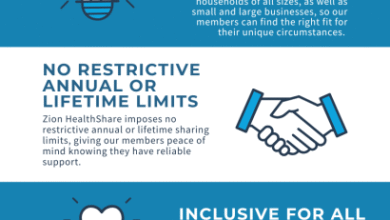Navigating State Mandates: How Zion HealthShare Fits In
If you’re exploring alternatives to traditional health insurance, you may be considering a health share membership, like Zion HealthShare. These community-based solutions offer an affordable and flexible way to manage medical expenses, but as with anything in healthcare, there are rules to consider, especially when it comes to state-specific mandates.
Certain states require residents to maintain qualifying health coverage or face a tax penalty. So, how does Zion HealthShare factor in? If you’re wondering whether a health share like Zion HealthShare can meet your state’s requirements, here’s what you should know.
What Are State Mandates?
A handful of states, including California, Massachusetts, New Jersey, Rhode Island, Washington D.C., and Washington State require residents to maintain qualifying health coverage or claim an exemption to avoid a penalty. These are known as individual mandates. While traditional insurance plans often meet these requirements automatically, health shares, like Zion HealthShare, are treated differently depending on your state.
Here’s a breakdown of what you need to know if you live in a state with penalties:
- California: California recognizes some health share memberships as an acceptable alternative to traditional insurance. However, if you live in California, you must annually submit from FTB 3853 when filing your state taxes, indicating your membership in a health share to claim an exemption from the state’s penalty. Please visit California’s Health Care Mandate and Exemptions page, for more information.
- Massachusetts: In Massachusetts, health shares are not classified as “Minimum Creditable Coverage” (MCC), meaning they don’t automatically meet the state’s requirements. However, Zion HealthShare has submitted filings with the state, which have been accepted for the past several years. As a result, members living in Massachusetts are considered exempt from the state’s penalty, so long as the appropriate documentation is submitted when filing state taxes. For more information on state mandates visit the Health Care Reform page.
- New Jersey: New Jersey also has an individual mandate that requires residents to maintain health coverage, but health shares like Zion HealthShare are eligible for exemption. However, you’ll need to confirm your eligibility when filing state taxes. For Zion HealthShare members in New Jersey, this means staying on top of the necessary paperwork and submitting the required forms at tax time. Learn more at New Jersey’s Health Coverage Requirement.
- Rhode Island: Rhode Island has implemented its own individual mandate requiring residents to have health insurance or face a penalty. Health share memberships can qualify for exemptions under certain conditions; however, they are not guaranteed. If you’re a Zion HealthShare member in Rhode Island or considering becoming a member, be sure to file the necessary paperwork at tax time. Visit Rhode Island’s Health Insurance Mandate for more information.
- Washington D.C.: Washington D.C. also has an individual mandate, and while health share memberships are generally not classified as traditional health insurance, Zion HealthShare members may qualify for exemptions under specific criteria. Residents in D.C. must file from D-210 with their taxes to confirm their exemption status. It’s important to note that exemption is not automatic. For more information about D.C.’s health mandate, visit the DC’s Individual Responsibility Requirement.
- Washington: Washington State has some of the most restrictive laws when it comes to health shares. According to state administrative code (WAC 284-43-8210), health shares are not classified as insurers, and the state’s Office of the Insurance Commissioner (OIC) has specific requirements that must be met. Zion HealthShare does not currently qualify as a Health Care Sharing Ministry (HCSM) under Washington’s definition, which limits our ability to serve residents there. While we are actively exploring solutions for Washington state residents, we recommend researching other affordable healthcare options if you live there. For more information visit Washington’s Office of the Insurance Commissioner page or review Zion HealthShare’s Washington Statement.
- Other States: Most other states do not have an individual mandate or a penalty for not having traditional insurance. However, healthcare regulations can change. Be sure to research your state’s regulations to know what’s required.
Important: Zion HealthShare is not insurance and does not guarantee exemption from any state tax penalties. However, in many states with individual mandates, members may qualify for exemptions by submitting the correct documentation. Always consult a tax professional for personalized guidance.
Does Zion HealthShare Meet State Mandate Requirements?
For many people looking into alternatives to traditional insurance, the good news is that Zion HealthShare offers an affordable, community-based solution that meets the needs of most states. Many of our members qualify for exemptions from state mandates, but the process can vary depending on where you live. The key is to make sure you’re submitting the right documentation to avoid unnecessary penalties.
Zion HealthShare provides a State Notices page where you can check the rules for your state, learn about exemption statuses, and find out what steps you need to take. It’s always a good idea to stay informed about your state’s requirements so you can avoid surprises when it’s time to file taxes.
What should you do next?
As you consider Zion HealthShare as an alternative to traditional insurance, it’s important to be proactive about understanding your state’s mandates. Here’s what you should do to stay compliant and ensure you’re not penalized:
- Check your state’s health share exemption rules: Each state has its own set of rules regarding health coverage, so it’s important to familiarize yourself with your state’s specific regulations. Some states require proof of health share membership, while others may have different criteria for exemptions.
- Gather any required forms: Some states may require you to submit documentation of your health share membership when filing your taxes. Be sure to have all the necessary forms and paperwork ready.
- Stay informed: Laws and regulations can change. Check out Zion HealthShare’s State Notices page for the most current information about your state.
- Reach out for help: Please consult with a tax professional for any state-specific tax questions and for help submitting forms.
Zion HealthShare: A Better Alternative to Traditional Health Insurance
At Zion HealthShare, we’re dedicated to providing a simple, affordable way for you to manage your healthcare costs. With no provider networks, confusing deductibles, or hidden costs, our members experience the freedom and transparency they’ve been looking for in healthcare.
Understanding your state’s individual mandate rules is one more way to take control of your health and financial future. We believe in empowering our members with the tools and resources they need to navigate healthcare with confidence, free from the stress and confusion that often comes with insurance.
Stay Informed and Join Our Community
If you’re ready to join a supportive community that’s focused on keeping healthcare costs manageable, Zion HealthShare may be the right fit for you.
Ready to get started? Join the Zion HealthShare Community and experience how straightforward managing your healthcare costs can be.
Zion HealthShare is not an insurance company. Neither this publication nor membership in Zion HealthShare are offered by an insurance company. Visit zionhealthshare.org to view your state-specific notice.
Current as of: June 4, 2025



